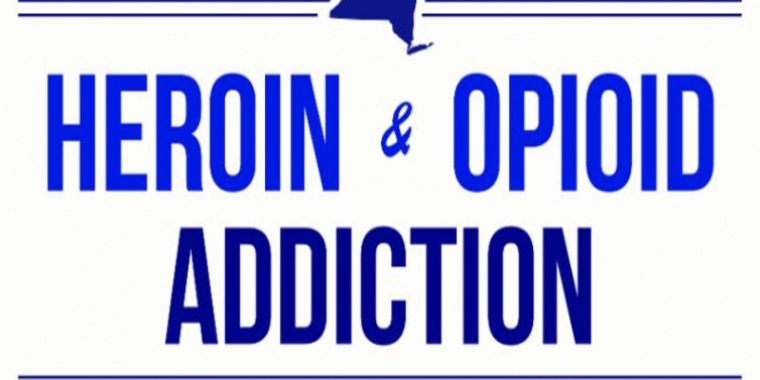
Senate completing action today on legislative package to bolster New York's anti-heroin efforts
June 14, 2017

Albany, N.Y., June 14—The New York State Senate today completed action on a comprehensive anti-heroin legislative package co-sponsored by State Senator Tom O’Mara (R,C,I-Big Flats).
O’Mara is a member of the Senate Task Force on Heroin and Opioid Addiction. The task force was created in 2014 at a time when local police departments and addiction centers, including many across the Southern Tier and Finger Lakes regions, were pointing to the alarming rise in the availability and use of heroin. O’Mara sponsored a task force hearing at Elmira College in early 2014 and another in Yates County early last year. He said that since 2014, while the work of the task force has helped enact important new state-level laws and other responses, the heroin crisis has grown increasingly urgent. Consequently, task force members are continuing to develop legislative recommendations for preventing the drug’s spread and treating those addicted.
O’Mara said, “Input from those on the front lines locally have targeted the necessary responses. We need to keep working, at every level of government, to keep our laws, programs and services ahead of this public health crisis. We can’t let up for one second on the alarming threat of heroin, opioids, meth, synthetic substances, bath salts and other illegal drugs spreading throughout our communities. In particular, the growing heroin and opioid crisis is far too great a risk to spiral out of control and overwhelm individual lives along with local systems of health care, law enforcement, criminal justice and social services.”
The Senate began approving the legislative package yesterday. It seeks to build on existing state-level laws, programs and services enacted over the past several years to strengthen awareness and education, prevention, treatment and recovery, and law enforcement efforts.
Legislation approved today would:
> require health care practitioners to receive written consent from a minor’s parent or legal guardian before prescribing a medical treatment involving opioids, and to discuss the risks of addiction and overdose (S5949);
> make it a crime to offer to or accept payment from an individual or entity that provides substance abuse services in exchange for patient referral and admission (S6544);
> establish the crime of fraudulent prescription, dispensing, and procurement of non-controlled substance prescription medications and devices, and establish the offense of unlawful possession of controlled substance prescription medications and devices (S2814);
> criminalize the sale of a controlled substance on or within 1,000 feet of the grounds of a drug or alcohol treatment center (S1127); and
> make the sale of 2 milligrams or more of Carfentanil a Class A-II felony, and the sale of 10 milligrams or more of Carfentanil an A-I felony. Carfentanil is a synthetic opioid 100 times deadlier than fentanyl, and 10,000 times stronger than morphine (S623).
The Senate will also act on legislation today to make the state’s Peer Engagement Program permanent. Peer engagement specialists coordinate with hospitals to assist addicts who have undergone an opioid overdose reversal, or after discharge from another substance abuse-related emergency, connect with additional addiction treatment services (S6509).
Yesterday, the Senate approved legislation to:
> allow law enforcement to charge a drug dealer with homicide, a class A-1 felony carrying a penalty of 15-25 years in prison, if a person dies of an overdose of heroin or other opiate-controlled substance sold by that dealer. The measure targets mid- to high- level drug suppliers who profit from heroin sales (S2761);
> facilitate the conviction of drug dealers by establishing a felony crime of intent to sell for possessing 50 or more packages of a Schedule I opium derivative, or possessing $300 or more worth of such drugs. Under current law, dealers can carry large quantities of the drug before triggering a felony charge of possession (S638);
> add six new derivatives of Fentanyl to the controlled substance schedule regulated by the state Department of Health (S5884). Fentanyl and fentanyl-laced heroin have caused many of the overdose deaths statewide;
> create new criminal penalties for heroin sales that take into account the lighter weight of heroin. Heroin weighs less than other drugs and, consequently, more doses of heroin are needed to trigger various, existing criminal offenses (S880);
> make the sale of a controlled substance by an adult to a minor under the age of 14 a Class A-II felony (S3845); and
> require health care practitioners to consult with patients on the risks associated with an opioid prescription and the patient’s option to have the prescription written for a lower quantity (S5670).
O’Mara credits the local input senators have received at the task force forums for driving increased state funding and new laws over the past three years. The 2017-2018 state budget, for example, includes nearly $215 million in new funding to establish state-operated addiction treatment centers, enhance community-based providers, and expand other programs and services.
The task force has heard testimony from regional law enforcement officers, treatment professionals, recovering addicts and family members, social services and mental health professionals, and other experts about the range of complex challenges posed by heroin including addiction prevention and treatment options, awareness and education, drug-related crimes, and other community and public safety impacts.
Share this Article or Press Release
Newsroom
Go to NewsroomO'Mara, Senate Republicans oppose 'Migrant Tax' on New Yorkers
September 20, 2023

Statement from Senator O'Mara on the 22nd Anniversary of 9/11
September 11, 2023


